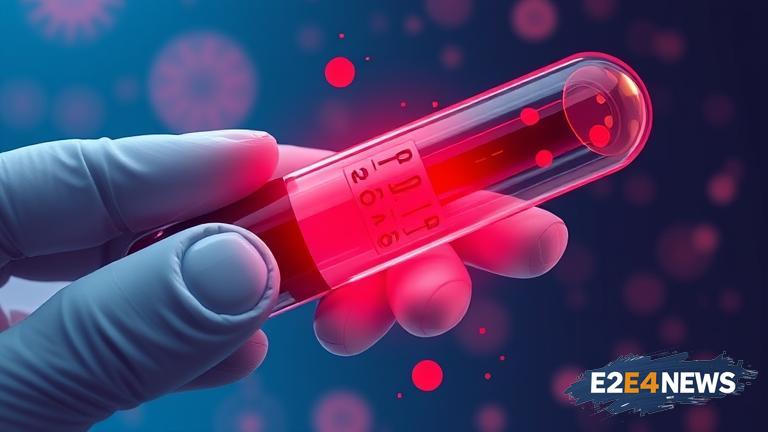A pioneering clinical trial is currently being conducted to evaluate the effectiveness of a novel blood test that has the potential to detect 10 various types of cancer in their earliest stages. This innovative test, which is still in the experimental phase, has been designed to identify specific biomarkers in the blood that are associated with different types of cancer. The trial, which is being led by a team of renowned researchers, aims to recruit thousands of participants to assess the accuracy and reliability of the test. If successful, this breakthrough blood test could revolutionize the way cancer is diagnosed and treated, enabling doctors to detect the disease at a stage when it is more easily treatable. The test has the potential to detect a range of cancers, including breast, lung, colon, and ovarian cancer, among others. By detecting cancer at an early stage, the test could significantly improve treatment outcomes and save thousands of lives. The trial is being hailed as a major breakthrough in the fight against cancer, and its findings are eagerly anticipated by the medical community. The blood test works by analyzing specific DNA mutations that are present in the blood of individuals with cancer. These mutations can be detected using advanced genetic sequencing techniques, which can identify the presence of cancerous cells in the blood. The test is non-invasive and requires only a simple blood sample, making it a relatively painless and risk-free procedure. The trial is being conducted in several locations around the world, including the United States, Europe, and Australia. Participants will be required to provide a blood sample, which will be analyzed using the novel test. The results will then be compared to traditional diagnostic methods, such as imaging tests and biopsies, to assess the accuracy and reliability of the test. The researchers behind the trial are optimistic about the potential of the test to improve cancer diagnosis and treatment. They believe that the test could be used to screen high-risk individuals, such as those with a family history of cancer, and to monitor patients who have already been diagnosed with cancer. The test could also be used to detect cancer in individuals who are experiencing symptoms, but have not yet been diagnosed. The trial is expected to take several years to complete, but the researchers are hopeful that the test could be available for clinical use within the next decade. The development of this breakthrough blood test is a testament to the power of medical research and the dedication of scientists and clinicians who are working tirelessly to improve our understanding and treatment of cancer. As the trial progresses, the researchers will continue to refine and improve the test, with the ultimate goal of making it available to patients around the world. The potential impact of this test on public health could be significant, and it is likely to be a major topic of discussion in the medical community for years to come. The trial is also expected to provide valuable insights into the biology of cancer, and could lead to the development of new treatments and therapies. In addition to its potential to improve cancer diagnosis and treatment, the test could also have significant economic benefits, by reducing the costs associated with cancer treatment and improving patient outcomes. The researchers behind the trial are working closely with regulatory agencies and healthcare providers to ensure that the test is safe and effective, and that it meets the highest standards of quality and reliability. Overall, the breakthrough blood test has the potential to be a game-changer in the fight against cancer, and its development is a major step forward in the quest to improve cancer diagnosis and treatment.
